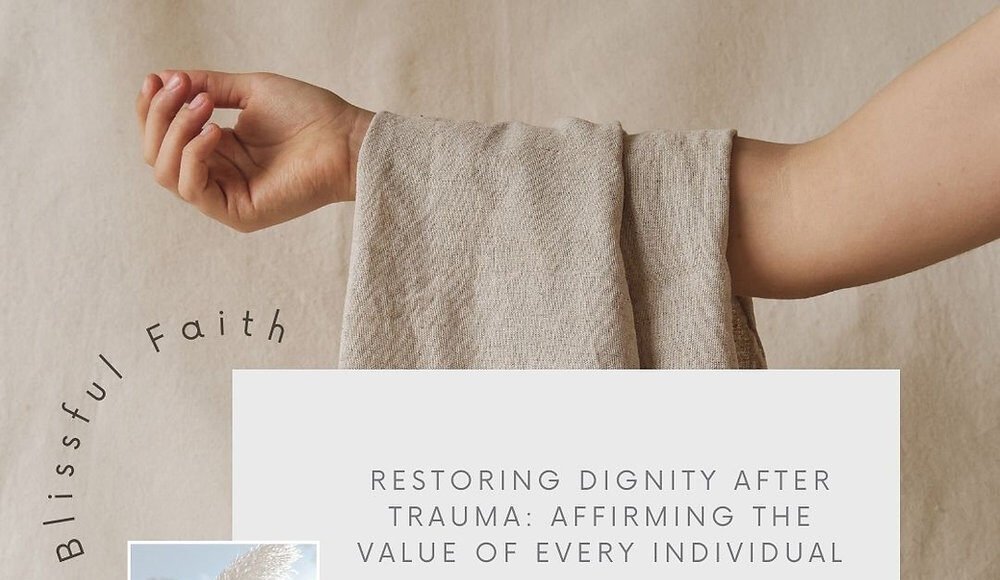Trauma has a profound impact on individuals, often stripping away their sense of dignity and worth. Whether it stems from abuse, violence, or natural disasters, the aftermath of trauma can leave survivors feeling broken and dehumanized. In this article, we will explore the importance of restoring dignity after trauma, affirming the value of every individual, drawing insights from scholarly research, and weaving in relevant scripture to illuminate the path toward healing and restoration.
The Biblical Foundation of Human Dignity
In Genesis 1:27, we are reminded that “God created mankind in his own image, in the image of God he created them; male and female he created them” (NIV). This foundational truth underscores the inherent dignity and worth of every human being, regardless of their circumstances or experiences. Throughout the Bible, we see examples of God’s compassion and love for the marginalized, the oppressed, and the broken-hearted, affirming their value and significance in His eyes.
Scholarly Insights on Dignity After Trauma
Research in the BMC Public Health (Tran et al., 2017) highlights the impact of trauma on individuals’ sense of self-worth and dignity. . Another aspect of this research is childhood maltreatment. All cases of maltreatment were associated with emotional dysfunction and disregulation. Sexual assault, physical abuse, and neglect were among childhood maltreatment cases evaluated. Survivors often experienced feelings of shame, guilt, and self-blame. These negative emotions can contribute to a cycle of self-destructive behaviors, isolation, and despair, undermining the process of healing and recovery.
Studies in the Journal of Canadian Family Physician (Purkey et al., 2018) emphasize the importance of trauma-informed care and interventions that prioritize dignity, respect, and empowerment for survivors. By fostering a sense of agency, autonomy, and choice, trauma survivors can reclaim their sense of dignity and autonomy, restoring a sense of control and purpose in their lives.
Restoring Dignity After Trauma:
1. Affirming Inherent Worth: Recognize and affirm the inherent worth and dignity of every individual, acknowledging their uniqueness and value as creations of God. Psalm 139:14 states “I praise you because I am fearfully and wonderfully made; your works are wonderful, I know that full well.”
2. Listening with Empathy: Listen to survivors’ stories with empathy, compassion, and respect, creating a safe and supportive space for them to express their emotions and experiences without judgment. (James 1:19 – “My dear brothers and sisters, take note of this: Everyone should be quick to listen, slow to speak and slow to become angry.”)
3. Validating Experiences: Validate survivors experiences, acknowledging the depth of their pain and trauma, and affirming the legitimacy of their emotions. (Romans 12:15 – “Rejoice with those who rejoice; mourn with those who mourn.”
4. Offering Practical Support: Offer practical support and assistance with daily tasks, transportation, childcare, or housing, alleviating stress and overwhelm and restoring a sense of dignity and autonomy. Refer when necessary. Give information to vital resources. Galatians 6:2 – “Carry each other’s burdens, and in this way you will fulfill the law of Christ.”
5. Encouraging Self-Compassion: Encourage survivors to practice self-compassion and self-care, cultivating kindness, acceptance, and forgiveness toward themselves as they navigate the healing journey. Matthew 22:39 – “And the second is like it: ‘Love your neighbor as yourself.’” This verse urges us to love how we would want to be loved: wholeheartedly, sacrificially, compassionately, and selflessly.
In conclusion, restoring dignity after trauma is a sacred and transformative process that affirms the value and worth of every individual. By recognizing survivors’ inherent dignity, listening with empathy, validating their experiences, offering practical support, and encouraging self-compassion, we can walk alongside them on the path toward healing and restoration. As we extend God’s love and grace to those who are hurting, may we be instruments of His peace, hope, and dignity, reflecting His image in the world.
Purkey, E., Patel, R., & Phillips, S. P. (2018). Trauma-informed care: Better care for everyone. Canadian family physician Medecin de famille canadien, 64(3), 170–172.
New Living Translation Bible. (1973-2011). Biblica, Inc.
Tran, N. K., Van Berkel, S. R., van IJzendoorn, M. H., & Alink, L. R. A. (2017). The association between child maltreatment and emotional, cognitive, and physical health functioning in Vietnam. BMC public health, 17(1), 332. https://doi.org/10.1186/s12889-017-4258-z






order amoxil pill – https://combamoxi.com/ amoxicillin online order
buy amoxicillin for sale – amoxicillin price buy amoxil generic
fluconazole usa – https://gpdifluca.com/ cost fluconazole
where can i buy fluconazole – order fluconazole 200mg sale diflucan pill
escitalopram 20mg tablet – https://escitapro.com/# buy escitalopram 10mg online
purchase lexapro for sale – site lexapro online order
buy cenforce 50mg – buy cenforce 50mg online cheap generic cenforce
buy cenforce no prescription – https://cenforcers.com/ cost cenforce
is cialis covered by insurance – buy liquid tadalafil online cialis australia online shopping
cialis ontario no prescription – does medicare cover cialis cialis or levitra
dapoxetine and tadalafil – https://strongtadafl.com/# tadalafil tablets erectafil 20
what possible side effect should a patient taking tadalafil report to a physician quizlet – https://strongtadafl.com/ evolution peptides tadalafil